汉语新词新译系列-G
- 格式:doc
- 大小:80.00 KB
- 文档页数:15

教育部公布的171个汉语新词释义详解8月16日,教育部在其官方网站发布了《中国语言生活状况报告(2006)》,列出了171条汉语新词语选目,大肚子经济险等入选其中,新词汇让人眼花缭乱,众多网友表示大多数看不懂,为此,本博客把绝大多数新词整理出相关释义,一同“扫盲”。
八荣八耻胡锦涛同志关于树立社会主义荣辱观的重要论述,明确了我国社会当前基本的价值取向和行为准则。
白托有说法是托了也白托,指骗子的意思。
还有一种说法是拜托的谐音。
抱抱装这个词列入新词汇我觉得蛮牵强的。
抱抱装是2006年发明的一种新产品,是一种能让人感觉到被拥抱的衣服,这种上衣采用高科技布料制成,能模仿被爱人拥抱的感觉。
当朋友通过短信传给你一个“拥抱”信息,手机会通过蓝牙技术“通知”这件衣服,它随即能把这个拥抱完整传递给你。
这件衣服可以储存多名亲友拥抱的力度、维持时间,甚至亲友的心跳节奏。
更为实用的是,这种衣服可以洗涤。
笔替、裸替、文替影视剧中的职业,即裸戏替身、书法戏替身和文戏替身。
其中“裸替”因章子怡《夜宴》“裸戏”替身事件而被大众所熟知。
随后,《黄金甲》又爆出笔替、文替,其中,文替是为了加快拍戏进度,替主演拍全景戏或有背影的戏。
博斗估计是指在博客世界里正反两方很热闹地打笔仗互相攻击谩骂以达到经济目的或寻找个人成就感的目的。
前者的代表是向文波,后者看来就是韩寒了。
博客话剧这个词明显有做广告的嫌疑。
所谓的博客话剧指的不过就是2006年上演的《新同居.blog》这部话剧。
之所以叫做“博客话剧”,一层意思是剧中的一些段落取自戴鹏飞在搜狐的个人博客。
还有一层意思是戴鹏飞自己的解释博客这个概念主要体现在话剧部分台词选自戴鹏飞的搜狐博客。
博客是一个私人日志,是一个公开的隐秘空间;话剧描写的是男女合租(北京租房非常多的现象,不是指未婚同居)的故事,在一个屋檐下发生的情感纠葛,二者吻合。
从话剧内容来讲,博客代表了形形色色的租房客,客随主便,符合话剧中人物特性。
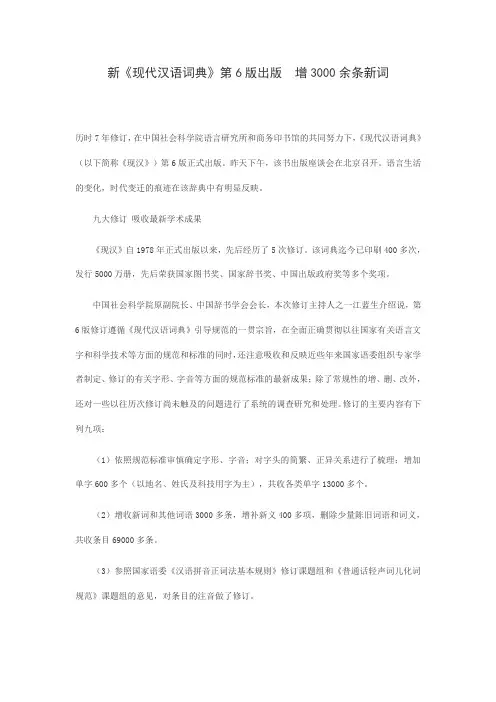
新《现代汉语词典》第6版出版增3000余条新词历时7年修订,在中国社会科学院语言研究所和商务印书馆的共同努力下,《现代汉语词典》(以下简称《现汉》)第6版正式出版。
昨天下午,该书出版座谈会在北京召开。
语言生活的变化,时代变迁的痕迹在该辞典中有明显反映。
九大修订吸收最新学术成果《现汉》自1978年正式出版以来,先后经历了5次修订。
该词典迄今已印刷400多次,发行5000万册,先后荣获国家图书奖、国家辞书奖、中国出版政府奖等多个奖项。
中国社会科学院原副院长、中国辞书学会会长,本次修订主持人之一江蓝生介绍说,第6版修订遵循《现代汉语词典》引导规范的一贯宗旨,在全面正确贯彻以往国家有关语言文字和科学技术等方面的规范和标准的同时,还注意吸收和反映近些年来国家语委组织专家学者制定、修订的有关字形、字音等方面的规范标准的最新成果;除了常规性的增、删、改外,还对一些以往历次修订尚未触及的问题进行了系统的调查研究和处理。
修订的主要内容有下列九项:(1)依照规范标准审慎确定字形、字音;对字头的简繁、正异关系进行了梳理;增加单字600多个(以地名、姓氏及科技用字为主),共收各类单字13000多个。
(2)增收新词和其他词语3000多条,增补新义400多项,删除少量陈旧词语和词义,共收条目69000多条。
(3)参照国家语委《汉语拼音正词法基本规则》修订课题组和《普通话轻声词儿化词规范》课题组的意见,对条目的注音做了修订。
(4)以意义为主要标准,对同形同音条目的分合做了调整;根据学理和语言使用的实际,调整了一批异形词的主副条。
(5)按类别(如“口语词、方言词、文言词、专科词、外来词、西文字母词”等)对释义进行全面检查和修订,对释义提示词(以“比喻、形容、借指”为主)也做了统一修订。
(6)复查了词类标注,在保持原有词类标注体系的基础上,对少数词的词类标注做了修订。
(7)本着更好地配合释义,体现用法以及扩大词汇信息量等原则,对例词、例句做了相应的增删和修改。
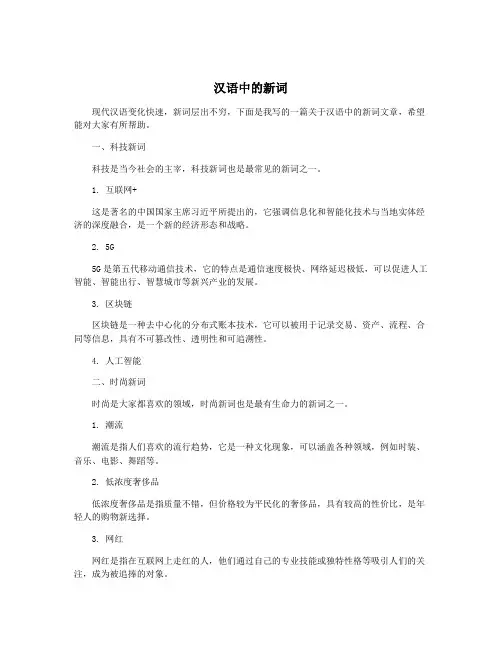
汉语中的新词现代汉语变化快速,新词层出不穷,下面是我写的一篇关于汉语中的新词文章,希望能对大家有所帮助。
一、科技新词科技是当今社会的主宰,科技新词也是最常见的新词之一。
1. 互联网+这是著名的中国国家主席习近平所提出的,它强调信息化和智能化技术与当地实体经济的深度融合,是一个新的经济形态和战略。
2. 5G5G是第五代移动通信技术,它的特点是通信速度极快、网络延迟极低,可以促进人工智能、智能出行、智慧城市等新兴产业的发展。
3. 区块链区块链是一种去中心化的分布式账本技术,它可以被用于记录交易、资产、流程、合同等信息,具有不可篡改性、透明性和可追溯性。
4. 人工智能二、时尚新词时尚是大家都喜欢的领域,时尚新词也是最有生命力的新词之一。
1. 潮流潮流是指人们喜欢的流行趋势,它是一种文化现象,可以涵盖各种领域,例如时装、音乐、电影、舞蹈等。
2. 低浓度奢侈品低浓度奢侈品是指质量不错,但价格较为平民化的奢侈品,具有较高的性价比,是年轻人的购物新选择。
3. 网红网红是指在互联网上走红的人,他们通过自己的专业技能或独特性格等吸引人们的关注,成为被追捧的对象。
三、社交新词社交是人际关系中不可或缺的一环,社交新词也相应产生。
1. 微信微信是腾讯公司开发的一款即时通讯应用程序,它很好的促进了人们之间的互动和交流。
2. 朋友圈朋友圈是微信的一个功能,它可以让用户分享自己的生活动态,与其他朋友互动和交流,既是一种社交方式,也是一种生活记录。
红包是一种在微信中非常流行的社交行为,它是送给好友或亲友的特殊礼物,也被称为“微信红包”。
四、环境新词环境保护已经成为全球人们的共同责任,为此,环境新词应运而生。
1. 绿色绿色代表环保,绿色产品是那些不会对环境造成不良影响的产品,比如绿色食品、绿色化妆品等。
2. 节约型社会节约型社会是指通过科技进步和人们的自觉行为,实现经济发展的同步提高环境质量的一种发展模式。
3. 碳中和碳中和是指通过减少二氧化碳的排放,或者通过一些清理工作,从而达到相对平衡的状态,它可以减缓全球变暖等环境问题。
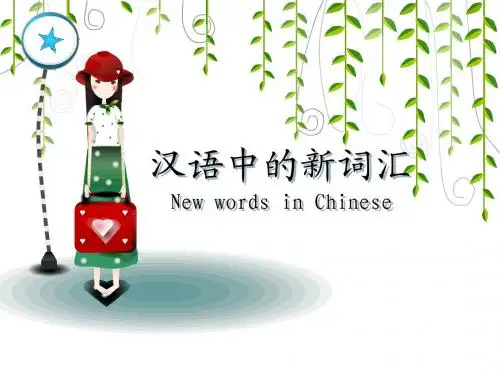
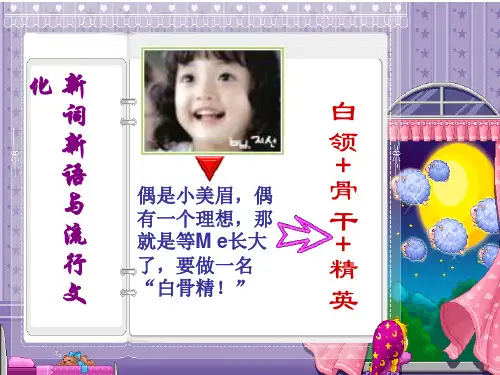
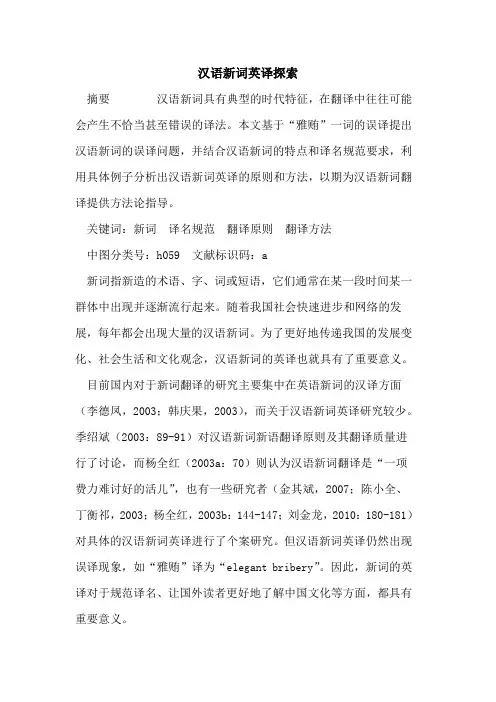
汉语新词英译探索摘要汉语新词具有典型的时代特征,在翻译中往往可能会产生不恰当甚至错误的译法。
本文基于“雅贿”一词的误译提出汉语新词的误译问题,并结合汉语新词的特点和译名规范要求,利用具体例子分析出汉语新词英译的原则和方法,以期为汉语新词翻译提供方法论指导。
关键词:新词译名规范翻译原则翻译方法中图分类号:h059 文献标识码:a新词指新造的术语、字、词或短语,它们通常在某一段时间某一群体中出现并逐渐流行起来。
随着我国社会快速进步和网络的发展,每年都会出现大量的汉语新词。
为了更好地传递我国的发展变化、社会生活和文化观念,汉语新词的英译也就具有了重要意义。
目前国内对于新词翻译的研究主要集中在英语新词的汉译方面(李德凤,2003;韩庆果,2003),而关于汉语新词英译研究较少。
季绍斌(2003:89-91)对汉语新词新语翻译原则及其翻译质量进行了讨论,而杨全红(2003a:70)则认为汉语新词翻译是“一项费力难讨好的活儿”,也有一些研究者(金其斌,2007;陈小全、丁衡祁,2003;杨全红,2003b:144-147;刘金龙,2010:180-181)对具体的汉语新词英译进行了个案研究。
但汉语新词英译仍然出现误译现象,如“雅贿”译为“elegant bribery”。
因此,新词的英译对于规范译名、让国外读者更好地了解中国文化等方面,都具有重要意义。
一“雅贿”的英译误译探析“雅贿”指以文雅古玩为行贿的方式贿赂官员,目前其英译为“elegant bribery”。
但实际上,该译名并没有真实表达出原词的真正意思。
到底该译名错在哪里呢?从当前的社会文化语境看,雅贿指行贿人不再以真金白银、香车豪宅和有价证券等物质行贿,而改送天价香烟、名家字画、珍奇古玩、周鼎宋瓷等,从而从主观上规避行贿风险,也为被行贿者贴上附庸风雅的标签,满足其心理需求,达到行贿的目的。
从该词的构词特征看,该新词的重点是“贿”,而雅只是相应的修饰成分,其结构属于偏正结构。
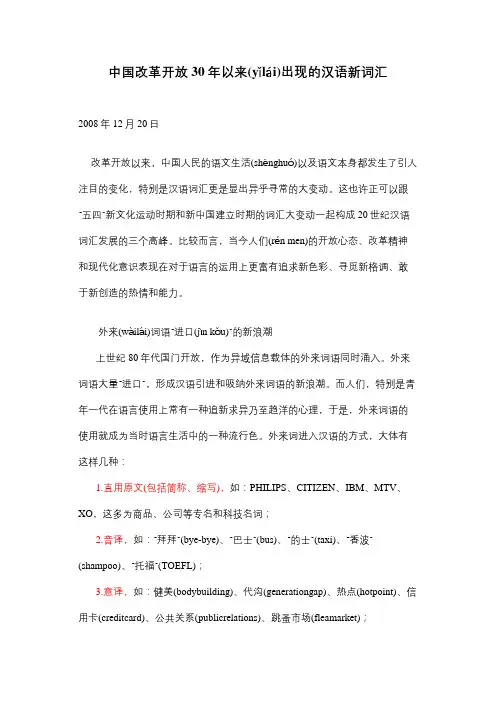
中国改革开放30年以来(yǐlái)出现的汉语新词汇2008年12月20日改革开放以来,中国人民的语文生活(shēnghuó)以及语文本身都发生了引人注目的变化,特别是汉语词汇更是显出异乎寻常的大变动。
这也许正可以跟“五四”新文化运动时期和新中国建立时期的词汇大变动一起构成20世纪汉语词汇发展的三个高峰。
比较而言,当今人们(rén men)的开放心态、改革精神和现代化意识表现在对于语言的运用上更富有追求新色彩、寻觅新格调、敢于新创造的热情和能力。
外来(wàilái)词语“进口(jìn kǒu)”的新浪潮上世纪80年代国门开放,作为异域信息载体的外来词语同时涌入。
外来词语大量“进口”,形成汉语引进和吸纳外来词语的新浪潮。
而人们,特别是青年一代在语言使用上常有一种追新求异乃至趋洋的心理,于是,外来词语的使用就成为当时语言生活中的一种流行色。
外来词进入汉语的方式,大体有这样几种:1.直用原文(包括简称、缩写),如:PHILIPS、CITIZEN、IBM、MTV、XO,这多为商品、公司等专名和科技名词;2.音译,如:“拜拜”(bye-bye)、“巴士”(bus)、“的士”(taxi)、“香波”(shampoo)、“托福”(TOEFL);3.意译,如:健美(bodybuilding)、代沟(generationgap)、热点(hotpoint)、信用卡(creditcard)、公共关系(publicrelations)、跳蚤市场(fleamarket);4.音译与意译的加合,如:迷你裙(miniskirt)、T恤衫(T-shirt)、耐克鞋(Nike)、霹雳舞(breakdance);5.汉字与外文字母的组合,如:卡拉OK、T恤(半原文半音译),BP机、CT扫描、VCD影视机(半原文半意译)。
外来词语的引进和吸收,是国际交流的必然和需要,也是丰富民族语言的一个重要途径。
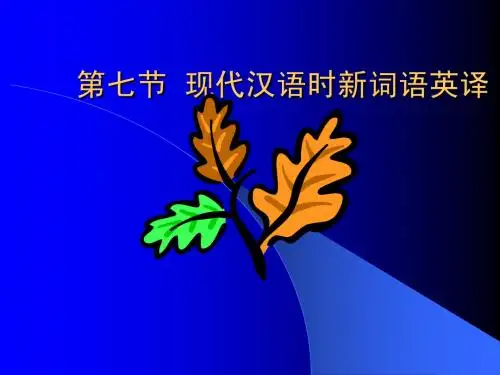
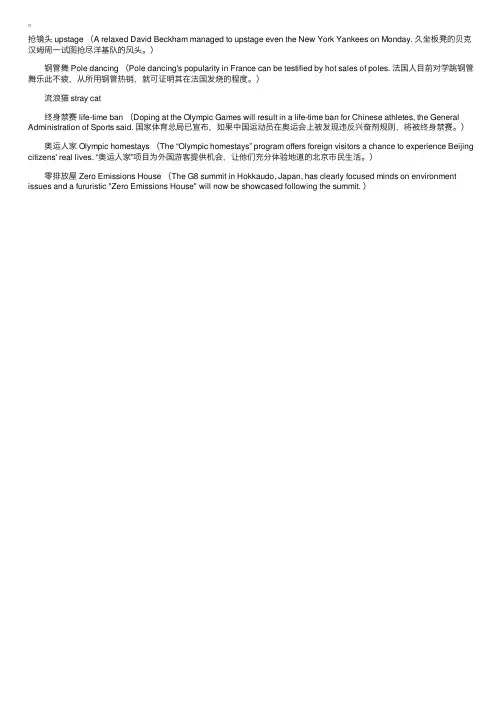
抢镜头 upstage (A relaxed David Beckham managed to upstage even the New York Yankees on Monday. 久坐板凳的贝克汉姆周⼀试图抢尽洋基队的风头。
) 钢管舞 Pole dancing (Pole dancing's popularity in France can be testified by hot sales of poles. 法国⼈⽬前对学跳钢管舞乐此不疲,从所⽤钢管热销,就可证明其在法国发烧的程度。
) 流浪猫 stray cat 终⾝禁赛 life-time ban (Doping at the Olympic Games will result in a life-time ban for Chinese athletes, the General Administration of Sports said. 国家体育总局已宣布,如果中国运动员在奥运会上被发现违反兴奋剂规则,将被终⾝禁赛。
) 奥运⼈家 Olympic homestays (The “Olympic homestays” program offers foreign visitors a chance to experience Beijing citizens' real lives. “奥运⼈家”项⽬为外国游客提供机会,让他们充分体验地道的北京市民⽣活。
) 零排放屋 Zero Emissions House (The G8 summit in Hokkaudo, Japan, has clearly focused minds on environment issues and a fururistic "Zero Emissions House" will now be showcased following the summit. )。

四川大学学报(哲学社会科学版)2004年增刊十年来流行的汉语新词新语刘娅莉(四川大学文学与新闻学院)[摘 要] 文章对所收录到的近十年来出现的478个新词新语进行了介绍和评论,并进行语义分类,分析了它们的流行原因、来源和构词特点。
[关键词] 新词;新语;新义 新中国成立以后,特别是国家实行改革开放政策以来,社会生活发生了巨大变化,国际交往日益频繁,经济发展,科技进步,外来文化涌入,这些变化首先在汉语的词汇中反映出来,出现了一批又一批的新词新语。
笔者以《汉语新词新语年编》(1997-2000)[1]所收录的新词、新语、新义为基础,并参考了《现代汉语词典》2002增补本在1996年修订本的基础上增收的新词语,按照它们的流行年代从中抽取出近十年来的新词新语共478个,进行了分析和讨论。
一、新词新语的语义分类478条新词新语可分为信息、社会生活、职业、文体(文学、艺术、体育)、交通、经济(包括股市、房地产)、法律、传媒、教育、政治、科技、环境、医疗、表述、其他共15类。
它们的分布情况如下表:类别数量百分比类别数量百分比信息901818%社会生活951919%职业14219%文体23418%交通6113%经济881814%法律17316%传媒23418%教育19410%政治17316%科技6113%环境13217%医疗3016%表述38719%其他26514% 按百分比由高至低排列依次为:社会生活→信息→经济→表述→文体、传媒→教育→政治、法律→职业→环境→交通、科技→医疗。
社会生活类词语中有关婚姻、恋情及家庭的占了多数,例如:暗恋、傍大款、包养、单亲妈妈、单身贵族、丁克家庭、二奶、非婚生子女、感情走私、花心、婚外情、畸恋、家庭暴力、家庭主男、全职太太、试婚、速配婚姻、新好男人。
此外,体现当代都市生活及现代消遣方式的也为数不少,例如:都市病、个人空间、黄金周、集卡族、假日经济、假日旅游、减肥综合症、健康老龄化、精神消费、快餐文化、旅游大餐、农家乐、派对、情感陪护、陶吧、蹦迪族。
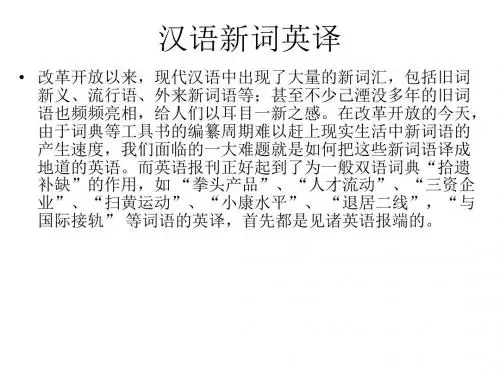
汉语新词语词典十大时代新词汉语新词语词典十大时代新词是指在近几十年来,随着社会发展、文化变迁以及技术革新,许多新的概念、新事物、新现象以及新技术都带来了一批新的汉语词汇,覆盖了政治、经济、社会生活等多个领域。
以下就是汉语新词语词典十大时代新词的详细介绍:1.O2O(Online to Offline):指用户通过网络平台(如手机APP、微信等)完成在线购买、支付,然后在实体店中完成消费的一种模式。
2.文创(Wenchuang):指将文化内容与商业运作相结合,形成新的文化消费模式。
3.AR(Augmented Reality):指增强现实技术,是一种使用虚拟图像和视频来扩展实际环境的技术。
4.MOOC(Massive Open Online Course):指网络上大规模开放性的网络课程,是一种面向全球的在线学习模式。
5.云计算(Cloud Computing):指利用互联网技术,将计算机硬件、软件、数据库、网络资源等集中管理,供用户远程访问和使用的一种计算技术。
6.智能家居(Smart Home):指利用智能技术,将家居中的家电、家具、安防等设备进行集中控制、联动操作的一种技术。
7.大数据(Big Data):指对海量数据进行挖掘分析,以获取有价值的信息和见解的一种技术。
8.智慧城市(Smart City):指城市利用信息技术和互联网技术,改善城市功能,提高城市管理水平和服务质量的一种发展理念。
9.智能物流(Intelligent Logistics):指利用IT 技术将物流运输过程中的数据与信息结合在一起,实现物流活动的自动化,提高物流效率和质量的一种技术。
10.区块链(Blockchain):指利用分布式数据库技术,将信息存储在一个由多个节点组成的去中心化网络中,以实现安全快速的数据交换和传输的一种技术。
以上为汉语新词语词典十大时代新词的介绍,它们不仅凸显出社会经济环境的变迁,而且由于新词语的不断出现,也为汉语的发展和提高提供了新的资源。
新词新语翻译举例“20年50个最流行的新词汇”的翻译艾滋病AIDS (acquired immune deficiency syndrome)按揭mortage; loan白领white collar; white-collared workers炒鱿鱼(译文见后文)打工job; odd job; do manual work; be an employee打假(译文见上文)大款tycoon; moneybag; fat cat; big-buck wealth; wealthy(substantial)individual倒爷profiteer; speculator; regrator; regrater; wheeler and dealer迪斯科disco; discotheque第三产业the tertiary industry; the service sector电脑(electronic) computer顶替take sb.'s place; get a job at one's parents' place of workwhen (s)he retires or dies东西联动interaction of eastern and western China分流employment redirection; diverting (laid-off workers)股票share; stock; share certificate国债national debt回归(译文见上文)回扣sales commission; rebate; kickback; netback; brokerage甲A甲B Grade -IA; Grade -IB兼职moonlighting; part-time job; hold two or more postsconcurrently减肥slim; reduce weight; get rid of excessive weight奖金bonus; premium; money award降息reduction of interests; reduce the interests卡拉OK karaoke快餐fast food; snack (food); quick/fast meal; short order; short-eat; MRE (meals ready to eat)利改税substitution of tax payment for profit dilivery; tax-payments instead of profit deliveries to the state; pay income tax instead of turning profit over to the state两个转变two (fundamental) shifts年薪annual salary; yearly pay平反redress; rehabilitate软着陆soft landing商品房commercial housing; residential building生猛海鲜fresh marine food; sea rarity市场经济market economy; market-oriented(directed) economy跳槽job hopping/transfer; a dock-and-dodge game; jump the trough;abandon one occupation in favor of another; seek a better job; giveup one job and take on another托福TOEFL (Test of English as a Foreign Language)万元户Wanyuanhu----ten-thousand yuan household; / a household whoseannual income from work exceeds ten thousand yuan.希望工程(译文见上文)下岗be laid off (sidelined,downsized)下海(译文见上文)乡镇企业village (town) and township enterprises小康a better-off level of moderate property; a fairly (relatively)comfortable life; be comfortably off休闲holiday-making; go on holidays一国两制one country, two systems一号文件Document (No.)1; No. 1 Document赞助encouragement; auspices; sponsor; patronage知识经济knowledge(-based) economy中国特色(with) Chinese characteristics; Sinicism转换机制transformation of the mechanism; change the mechanism;资本运作operation (manipulation) of capital资产重组regrouping of property (assets)。
奥运人家Olympic Home Stay办公桌轮用制Hot Desking必剩客Doomed Single彩虹族Rainbow Clan草莓族Strawberry Generation食草男Herbivore Men车船使用税Vehicle and Vessel Tax出勤主义Presenteeism错时上下班Staggered Rush Hour Plan 大礼包Gift Packs低碳经济Low—carbon Economy钓鱼短信Smishing钓鱼执法Entrapment独立展馆Stand—alone Pavilion独生子女China One赌球Football Gambling反补贴税Countervailing Duties房奴Mortgage Slave非自住业主Non-owner-occupier封闭式管理Closed-off Management 刚性需求Rigid Demand杠杆女Leverage Female高龄津贴Old Age Allowance挂钥匙儿童Latchkey Kid国学大师Master of Chinese Culture 耗水产业Water-intensive Industry红衫军Redshirting黄标车Yellow Label Car鸡仔文学Chick Lit集体合同Collective Contract假按揭Fake Mortgage Loans僵尸电脑Zombie Machine交通拥堵费Traffic Jam Fee教育公平Equal Access to Education 就业预警机制Job Alert System决堤Breaching of the Dyke绝杀Last—gasp Goal历女Rekijyo廉政准则Code of Ethics零帕族Zero—Pascal Clan绿婚Green Marriage裸婚Naked Wedding麦兜族Mcdull Clan/Tribe面子工程Vanity Project秒杀Seckilling名人堂Walk of Fame拇指规则Rule of Thumb拇指族Oyayubizoku/Clan of the Thumbs 脑残体Leetspeak泡客族Perfect Career陪拼族Shopping Follower漂移农场船Floating Farm Ship拼爹游戏Competition of Family Background 拼养Baby-pooling亲子环Parent-child Bracelet热指数Heat Index入境限制Ban on Entry人园难Kindergarten Crunch森女Mori Girl商业炒作Commercial Exploitation时间银行Time Banking实名购票ID-based Ticket Booking System食疗Food Therapy世博概念股Expo—related Stocks世博护照Expo Passport收入分配Income Distribution手机幻听Phantom Rings数字游民Digital Nomad水利工程Water Conservancy Project碳税Carbon Tax碳足迹Carbon Footprint退休金双轨制Dual Pension Scheme网络寡妇Cyberwidow网络推手Internet Marketer忘年恋May-December Romance伪娘Cross-dresser问责制Accountability System蜗婚laving Apart Together蜗居Dwelling Narrowness性别比Sex Ratio学历门Fake Degree Case堰塞湖Quake Lake房屋拆迁Housing Demolition and Relocation 移动支付Mobile Payment蚁族Ant Tribe隐婚族Fake Singles友好城市Sister Cities有偿新闻Paid News诈捐门Donotation Fraud宅度假Staycation职场冷暴力Emotional Office Abuse职务消费Position-related Consumption 植入式广告Product Placement指定日Designated Day中国模式China Model钟摆族Pendulum Clan专线巴士Shuttle Bus自由放养儿童Free-range Kid走私族Sneaky Chatt&s足球寡妇Football Widow。
汉语新词新译系列-G跟单货(gen dan huo)knockoff productsThe term refers to commodities, especially in the fashion business, that copy authentic products but use substandard material.过渡引用(guodu yin yong)overquoteThis term is often used by some academicians as a euphemism for plagiarizing other people's academic works. It's now also cited by some Netizens to satirize such reprehensible behavior.鬼马(gui ma)wittyThe expression is often used these days to describe a person who is sharp-minded and humorous, and prone to taking weird actions or saying unexpected words.购房落户(gou fang luo hu)house-for-residency policyMany governments in major cities in China, such as Hangzhou and Chengdu, have rolled out new policies to encourage migrant people to purchase houses so that they can get a local hukou or local residency paper. The policy is designed to boost the local real estate market.怪咖(guai ka)geekThe slang refers to those intellectuals obsessed with mind games, such as sudoku and crosswords. Although being described as a geek tends to be an insult, the term has recently become a fond nickname, or even a badge of honor.谷歌依赖症(gǔ gē yī lài zhèng)discomgooglationThis term refers to the feeling of distress or anxiety at being unable to gain immediate access to information. It's a portmanteau of discombobulate, meaning to confuse or frustrate, and Google. According to a survey, about 44 percent of Internet users in the UK said they were frustrated at being unable to go online and 27 percent said theyexperienced increased stress levels.个人所得税起征点(geren suodeshui qizhengdian)threshold of personal taxable incomeChina's top legislature recently issued the new threshold for taxable income, 1,600 yuan(US$198) a month, which will be effective from next year. It doubles the previous threshold which was unchanged for more than decade.灌水(guanshui)flood-bloggingWhen guanshui is used in the context of Internet, it does not mean "irrigation" as in its normal use. Some Web bloggers upload tons of nonsense or neither here nor there trivial in order to earn more online credits but only to be scorned by blog viewers for wasting their time and the server space.跟帖(gentie)follow-up commentIt refers to the comments or articles that are posted as a follow-up to what a thread starter did in a chat room or on BBS.过劳死(guolaosi)karoshiThis Chinese term is a direct translation of "death from overwork." The term first appeared in Japan in the late 1980s to describe a new phenomenon of high-ranking business executives dying in their prime years without any previous signs of illness. Now the same thing is happening among middle-aged Chinese businessmen and professionals.光棍儿节(guanggun'r jie)Singles' DayEvery year at 11:11pm on November 11, fun-seeking male college students will have rowdy parties by screaming out their desire to find a girlfriend and use whatever is available to make big noises. The timing, consisting of eight Arabic number of 1, is deliberately selected to personify many single people. Can you envisage a Single Women's Day?官府菜(guanfucai)official's home cuisineMost cooks at residences of senior officials in feudal China were able to prepare specialty dishes. The recipes passed down for generations have helped establish some restaurants offering such dishes, like Beijing-based the Tan's restaurant.古惑仔(guhuozai)offbeat boysThe phrase refers to teenagers who pursue an unconventional lifestyle and behavior, including weird hairstyles and clothing and accessories. They also tend to drink alcohol, smoke cigarettes and get into street fights. They account for about 70 percent of juvenile delinquents in big cities across the country.官瘾(guanyin)lust for official powerGuan in Chinese means "officialdom." Yin means "lust." This Chinese term describes many people who lust official power.搞定(gaoding)fix something or someoneTo gaoding someone has almost the same meaning as "fixing" someone. It could mean you have reached a deal with someone, or even have someone deep-sixed. To gaoding something also has similar meanings as "fixing" something.骨灰级(guhuiji)guruThose well-acclaimed masters in a field are referred to by today's youngsters as someone at a guhui level. However, caution is suggested when speaking in the face of such a master, if he or she is elderly, as he or she may take offense at the Chinese term, which means bone ashes.过劳模(guolaomo)overworked workers, model of modelsThose who work far more than eight hours a day, either voluntarily or otherwise, are called a "guolaomo," or an overworked worker. Accordingly, they may draw either juice of joy or poison of pain from the long working hours. The term is coined after the word karoshi.高薪跳蚤(gaoxin tiaozao)high-salary job hopperThis Chinese term means literally a "high-salary flea." Since a flea can "hop" very "high" considering its small body, the term is actually used to describe highly paid job hoppers.高考状元(gaokaozhaungyuan)college entrance exam aceThis word means the top scorers in college entrance exams. Such cream of the crop is usually taken away by top universities in the country.挂羊头,卖狗肉(guayangtou, maigourou)bait and switchThe popular Chinese term translates literally "advertising with a sheep's head, but actually selling the dog meat." It is often used to describe the bait-and-switch tactic when someone tries to sell inferior or substandard stuff in the name of quality products.轧闹猛(ganaomeng)follow suit en masseThis popular phrase in Shanghai dialect reflects the fact that many locals love to follow fashion trends, ride the bandwagon, do what most people do and go where most go.轧山湖(gashanhu)chat casuallyThe colloquial expression in Shanghai dialect means chewing the rag or shooting the breeze. In different localities, there are different terms for chatting idly, such as "kandashan" in Mandarin in northern China and "bailongmenzhen" in Sichuan Province in southwest China.戆大(gangda)ganderThis word is a typical example of Chinglish expressions used in Shanghai dialect. The local pronunciation of the word is quite similar to the English word "gander." The term is used to insult someone's intelligence.膏方(gaofang)tonic prescriptionThis Chinese term means a tonic prescription that has the principal aim of enhancingthe immune system functions. Many people, particularly the elderly or the weakly, will seek tonic prescriptions in winter as it is deemed the best season to take tonics.搞脑子(gaonaozi)brain teaser, brain basherThis is a Shanghai colloquial term, meaning something which is difficult to figure out or a problem which takes a lot of brain to resolve.高压线(gaoyaxian)top prohibitionsThe term means literally a high-voltage line. But it is often used to refer to rules that one should never break because it will prove to be as lethal as touching thehigh-tension wire.谷歌炸弹(guge zhadan)Google bombingThis Chinese translation of the English term means setting up a large number of Web pages with links that point to a specific Website so that the site will appear near the top of a Google search when users enter the link text.干货(ganhuo)substance, real stuffThe term originally means dry cargo or dried food, but it is often figuratively to mean substantial stuff or the essence of things. A person has ganhuo if he or she has solid thoughts. A book has ganhuo if it is not full of wishy-washy mumbo jumbo.果冻族(guodongzu)jelly clanIt refers to those young Chinese born in the 1980s who are seen as soft and fragile as jelly. They usually have pleasant looks but a weak heart and boast little resistance against pressure.钢管舞(gangguanwu)pole danceIt is an irony that some fashion-conscious white-collar women in large Chinese cities like Shanghai and Beijing have taken to pole dancing as a form of exercise in their spare-time while it's often seen as a popular performance at strip clubs in Western countries.公寓式仓库(gongyushicangku)garage condosThe Chinese phrase derives from a US terminology referring to garages located at sites that look like ordinary storage rental facilities, but they come with unusual features, such as heat and air conditioning and clubhouses. They are sold like condominium apartments, where the owner gets title to one unit in a complex of garages. Some buyers use their units to store big boats, fancy cars or collectibles.公费游(gongfeiyou)junketThe Chinese characteristic of a junket is that it always goes under the name of an official business or assignment. Recently, some senior government officials in Anhui Province were discovered using public funds and false documents to embark on an overseas sightseeing trip.硅谷新贵(guigu xingui)IT nouveau richeThe in expression refers to either those high-end IT talent who ride the wave of spending on fashion products and services like spas or those are never tired of undergoing silica gel-based plastic surgeries. The first two words of the Chinese expression means Silicon Valley while the latter means nouveau riche.古惑仔(guhuozai)young eccentric, punkThis is a Cantonese term widely used in Guangdong Province and Hong Kong. It refers to young eccentrics who wear strange clothes and act in a maverick way or juvenile delinquents who frequently commit minor crimes.骨感型(guganxing)boney clanThe term means the boney type. Young women who desire a slim figure often follow the example of boney fashion models strutting the catwalk. However, many people see this trend as unhealthy and unattractive.干股(gangu)gift stocksThe "dry stocks," as the Chinese term translates literally, refer to the shares acompany offers to someone as a present. China's Supreme Court has just defined the practice as illegal for government officials.古墓贴(gumutie)age-old postSome Netizens love to update old posts published on BBS several years ago to the front page in order to arouse a new round of discussion. The Chinese term here means literally a post from an ancient tomb.赶场子(ganchangzi)function venue hopping, whirlwind partyingAs a spinoff of modern urban life, many people have to go to frequent parties and functions during their spare time and while officially on holiday.高疯贝(gaofengbei)crazy gamesThe Chinese term sounds like 高分贝, which means "high decibel." It actually refers to highly exciting rides like roller coasters.贵族乞丐(guizuqigai)rich beggarIt refers to those professional beggars who reportedly are rich enough to own a car and keep a mistress.干物女(ganwunu)himono onnaThe increasingly popular term originates from a Japanese manga "Hotaru No Hikari," describing women who show great ability in their daily business but actually live a dull and lonely life after work. They don't have boyfriends and miss out on romance even when they are in their twenties. "Himono" means a dried fish and "onna" is woman in Japanese.公司驻虫(gongsizhuchong)resident office workerIt refers to office workers, especially in the fields of IT, art design and media, between the ages of 25 and 45 who work, eat, entertain, exercise, and even live, in their offices or nearby facilities. This is either because they are too busy to return home after work or because they want to save on living cost as a young career starter with too manythings, such as an apartment or car, to buy.甘党(gandang)sweet-tooth clanUrban youths often refer to those who have a craving for sweet food as following the group. The Chinese word 甘means sweet and 党a party, gang, or a cluster of people.搞怪(gaoguai)spoof, parodyOn Internet or in daily life, many young people nowadays love to make fun of their friends, teachers or celebrities by altering their pictures, voices or mimicking their behavior. Sometimes, the term may also mean to act in an outrageous way.格子店(gezidian)shelf shopThis term has become popular among students and white collars who cannot afford to open their own shops. But at the shelf shops, they can rent small units or cabinets in large shopping malls at a cost of hundreds of yuan per month to sell small products such as toys, cosmetics and accessories.购物狂(gouwukuang)shopaholicThose who shop for shopping's sake rather than actual need fall into this category. They enjoy the act of buying things rather more than actually using them.挂科(guake)flunkIt is an expression popular with college students these days when talking about failing an exam.高楼(gaolou)high-rise postingWidely used online, it refers to topics that attract hundreds of postings. In online communities, one posting is regarded as one storey, so popular topics are likehigh-rise towers.公主帮(gongzhubang)celebutanteA portmanteau of the words celebrity and debutante, referring to young, rich women in the news for their extravagant way of life.公司腐败官(gong si fu bai guan)CFOThe term means Corporate Fraud Officer here, not chief financial officer. It is another example of borrowing and twisting the meaning of an existing term.跟风(gen feng)copycat, follow blindlyA copycat is a person who mimics other people. The word means someone following a trend often in a blind way.孤儿(gu er)office lonerThis term, meaning literally "orphan," is often used by young people to refer to an office worker who is isolated, or chooses to be isolated, by others, either because of his or her bad behavior, disputable character or other problems.格子店(ge zi dian)pigeonhole shopA kind of store where cabinet boxes are rented out to different people to sell various types of goods. It has become popular among young people, especially white-collars as they don't have to stay in the store themselves.高楼掷物、致命垃圾(gaolouzhiwu, zhiminglaji)killer litterThe term refers to garbage dropped from high buildings. In a mega-city like Shanghai, which is crowded with highrises, killer litter remains a protracted headache.孤老(gulao)elder orphanThis Chinese term means literately the "lone elder." It refers to an elderly person who has no family or can't obtain any support from his/her family. In China, it also indicates that the elderly person has no pension and is incapable of making a living. This is not a new phenomenon, but the number of them has been increasing quickly asour society ages.谷歌文(gugewen)Googlese textScholar Xu Lai coined this term. He uses it to describe written works created by Internet writers who base their text on materials obtained by Googling. Such writers can hardly guarantee the accuracy of their data and frequently risk stepping into plagiarism disputes.高考房(gao kao fang)exam-break roomMany parents in large Chinese cities are tending to book a room as a place for a noon break for their child during the three-day national college entrance exams. This allows them to avoid traveling between their home and the examination venue.过度引用(guo du yin yong)overquoteIt has become a euphemism for authorities in a Chinese college to report, in concluding their probe into a plagiarism claim, that a professor in the school had "overquoted" from research papers.挂马(gua ma)Trojan horseThe Chinese word means "to place a horse" and the "horse" stands for Trojan horse programs. A hacker distributes a Trojan horse through the Internet. Anyone who enters the affected Website will automatically download Trojan horses, causing their computers to crash.观音兵(guan yin bing)women's page boyWhen a man is extremely eager to please women, he will stand by and go out of his way to run errands for them, just like a soldier taking every order from his commander. 观音, or Kuan-yin, is traditionally associated by Chinese people with women, though the Buddha itself is technically a male.官博(guan bo)officials' blogsIt refers to the real-name blogs of some government officials who usually create blogs just as a show of being close to the people but in reality they seldom update the blogs.杠杆女(gang gan nv)lever womenThe term refers to wives who play their advantages to the full to help their husbands succeed in careers. Such women are compared to levers to lift their husbands.格格党(ge ge dang)princess clanIt is a workplace expression to describe those who were born after 1985, take their job as play, pay too much attention to their own needs and are too socially unsophisticated to heed public standards.规则潜(gui zeqian)defunct rulesThe term, a literal reversion of "hidden rules" in Chinese, refers to rules and regulations which no longer punish violators and do not work well any more. The defunct rules in fact foster hidden rules to some extent, the unspoken cues that dictate behavior and actions.搞手族(gao shou zu)online organizer clanThe term, derived from Cantonese, refers to people who issue Website posts to organize various get-togethers such as mountain climbing, pub crawling and karaoke. Participants usually prepay while the organizer takes a cut from either the Website or the venue provider after each get-together. The monthly return can be 1,000 yuan (US$146).官二代(guan er dai)the second officer generationThe term, another word popular over the Internet after "the second rich generation" and "the second poor generation," refers to children from families of senior officials. Their privileges are based on their parents' power or other useful networks, instead of their own accomplishments. This second generation is notorious for their domineering practices and other misdeeds that annoy the public.鬼旋族(gui xuan zu)city roamersThe term refers to white-collar workers under pressure who would rather wander around on the streets without a purpose until midnight than go home after work. Experts say the city roamers are lonely yet successful people that need a family to warm their heart.怪蜀黍(guai shu shu)lolita man/pedophileThe expression in Chinese pronounces the same as 怪叔叔,or strange uncle, an online allusion to the pedophilic man in a southern China city who was involved in a sex scandal last year.光替(guang ti)lighting stand-inThe term refers to people who substitute for big stars, leading actors or actresses during movie shoots by standing still for lighting tests in preparation for sequence filming.过度医疗(guo du yi liao)overdose treatmentMany doctors in Chinese hospitals have been accused of dishonestly prescribing far more expensive medication and more clinical tests for their patients than necessary as a means of pumping up their wallets.古董衫(gu dong shan)vintage clothesThe term refers to new or second-hand garments that originate from a previous era. The word vintage here is an elegant-sounding euphemism for old. It literally means an antique dress.高低男(gao di nan)men of high IQ but low EQIt is a label used in the Chinese match-making market for those young men who are well-educated and well established in career but are poor in communicating and socializing skills. More often than not these people have bad luck along the road to romance.戆大(gang du)Idiot, fool, simpletonSome people believe this phrase comes from the English word "gander" because they sound alike and share almost identical meanings. However, others argue that it is an aboriginal term. In this phrase, the first character "戆" means "stupid or simple," and the second means "big or elder."In rural areas of Shanghai, people say that the eldest child in a family is usually more honest, obedient or simple-minded, but the second child tends to be smart, shrewd and mischievous. Thus, 戆大(gang du), as the "simple-minded elder," is now used to describe anyone who's a fool or simpleton.攻略(gong lue)detailed guideWith World Expo 2010 occurring in Shanghai's backyard, many youngsters havedevoted themselves to working out an informal guide to avoiding crowds and long queues and finding the most convenient ways to visit the Expo site.轧闹猛(ga nao mang)Join in the fun, take part in the merriment, add troubleThis term combines the verb "轧," meaning "roll" or "join in" and "participate in," with the phrase "闹猛," meaning "full of bustling activities," "lively" or "a noisy crowd" in colloquial Shanghainese. You can hear the phrase "闹猛" in ordinary local conversation every day, because city people just can't get enough hustling and bustling.So, in locals' mind the term gives the image of squeezing into a noisy crowd and joining in the fun. However, it may also mean adding trouble. For instance, just when you have your hands full with multi-tasking, someone comes up and asks you to do something else right away. That's another kind of 轧闹猛(ga nao mang).公公知识分子(gong gong zhi shi fen zi)coward intellectualsThe phrase sounds like "public intellectuals." Yet the second Chinese character is different, making the phrase literally mean "eunuch intellectuals." The sarcastic expression refers to those intellectuals or professors who have no backbone and say whatever people in power need them to say.果粉(guo fen)Apple fanThe term refers to die-hard supporters for any digital gadget produced by Apple Inc. The enthusiasts line up for hours, even days, to buy the latest products, such as iPads and the latest smart phone iPhone.罐头笑声(guan tou xiao sheng)canned laughter, laugh trackFake audience laughter is a separate soundtrack inserted into sitcoms and TV comedies. The mechanical laughter recording is compared to bland canned food that always tastes similar.轧三胡(ga sei wu)Chat, gossip, shoot the breezeIn the late Qing Dynasty (1644-1911), there were three celebrities -- businessman, a painter and a prostitute -- sharing the same surname "Hu" in Shanghai. Naturally, their names were frequently mentioned in local gossip. So, later, talking about the three "Hu" or 轧三胡(ga sei wu) became a popular term used to describe people gossiping.That's one of the several etymological stories about the Shanghainese phrase 轧三胡(ga sei wu).Another story was about a Chinese musical instrument called "二胡" or a twostringed fiddle. It's difficult to master the skill of playing "二胡" and someone learning the instrument could produce a lot of noise and soon lose interest in it. Irritated by the strident sound, people tended to ridicule a poor player by saying "三胡"(three-stringed fiddle) instead of "二胡". Later, the term of playing "三胡" or 轧三胡(ga sei wu) came to mean chatting idly or shooting the breeze.In current usage, 轧三胡(ga sei wu) means to chat, engage in idle conversation or gossip.过立废(guo li fei)overqualifiedWhen an employee is far too qualified for a job, an employer will shudder at the idea of offering him or her a vacancy for fear they will be half-hearted at work or gojob-hopping at any minute. In this case, overqualification means useless or wasted in the job market.给力/不给力(gei li /bu gei li)cool/dullAn expression gaining popularity in both online posts and publications in China. It evolved from a north China dialect, “不给力” which roughly translates as disagreeable.刚需族(gang xu zu)real homebuyerThese are people who genuinely need a home, such as first-time buyers, young couples and those who settle in another city. It's distinct from property speculators.过度包装(guo du bao zhuang)over-packagingThe commercial practice of doing up merchandise in far too fancy and expensive packages has been blamed for contributing to corruption, and extravagance and waste in China.高姐(gao jie)bullet train stewardessThe term is derived from airline stewardess and was coined after China startedhigh-speed bullet train services. Train attendants are required to meet strict standards for height, build and attractiveness, similar to those used when recruiting flight attendants.。